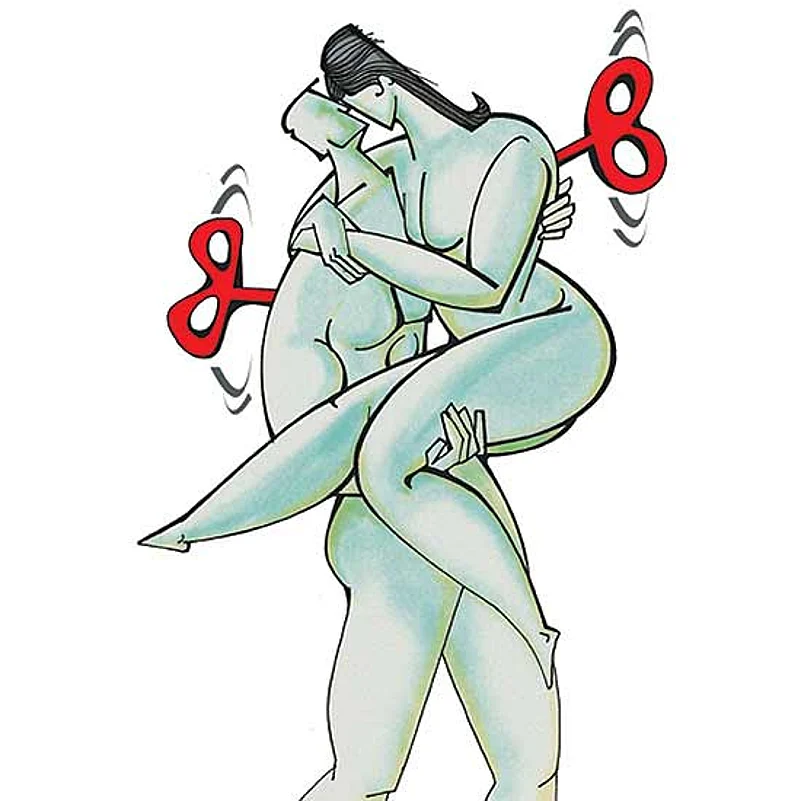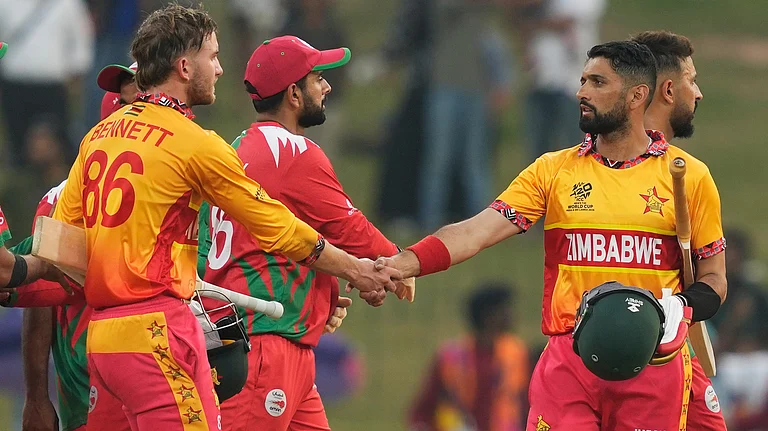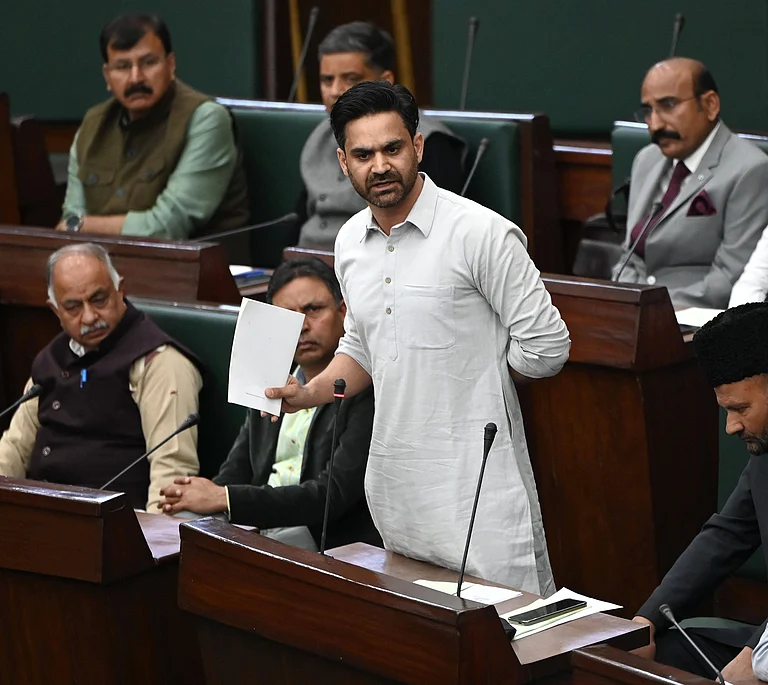Three men are discussing how often they have sex. The young man boasts, “Twice daily.” The middle-aged man says, “Twice weekly.” And the old man squeaks, “Twice a year, weakly.” If you haven’t been hearing this joke lately, it may be because many studies (including my own experience) suggest that sex is in the mind, which often triumphs over matter: if you think sexy, then you are likely to be hot, almost regardless of age. To put it in another way, having sex on the brain may not be such a bad thing, after all.
In which case, how do you define “middle age”? Middle of what? Between old age (Anthony Quinn, who was 80 when he fathered his youngest child) and awkward and incompetent post-pubertal youth, as hilariously depicted in the British television comedy The In-Betweeners, and which provided much comic material for my first novel? As the Bob Dylan song goes, “things have changed”, and medical advances give every 30-year-old a fair chance of making it to 90, and at least half a chance of being sexually active past 70. Moreover, the sex drive and the chemistry of attraction vary so much from individual to individual and from society to society (young women used to throw themselves at a much-older Charlie Chaplin) that all such answers are relative, so I can only speak truthfully from my own limited heterosexual experience.
My generation grew up in the late 1960-70s, and for us late teen virgins, sex was entirely in the head—because the doors to real sex were shut tight for any but the wealthy and the very lucky. While my mixed group of ‘radicals’ urged the ‘upliftment of the masses’, the conversation quickly shifted from masses to arses, and to post-Einsteinian theories such as “the angle of the dangle is directly proportionate to the mass of the arse”. It was rich talk, but just talk; youth, for us, was full of missed opportunities, because of the fear of impregnation and a shotgun marriage. Repression had its perks: hours and days of exquisite, tantalisingly delicious foreplay with prospective brides, foreplay that could only be foreplay because penetration before marriage was simply out of the question. How many married couples spend more than an hour or two at foreplay, and what a loss!
And then, suddenly, with tremendous speed, before we could sow our wild oats, we found ourselves married and parents with onerous child-management responsibilities in a post-Joint Family Age, especially for those of us who immigrated to the west. Sex was downgraded from The Main Event to just another chore, like doing the laundry or picking up milk for the kids. Some sense of fair play restrained that Inner Casanova (in us men) that wants to bed as many women in as many different positions as possible. Playing around would give our spouses the licence to do likewise—something we were unprepared for. And marital sex, especially for a two-career couple, has its limits.
Paradoxically, my otherwise painful divorce threw the door wide open to sexual variety and occasionally exceptional, anti-depressant, and rejuvenating sex. (Like most good jokes, the Groucho Marx line “You are as young as the woman you feel” has an element of truth to it.) To adapt an idea from Aristotle, if tragedy and terror are good for the soul, then one compensation of a bad divorce may be to make your senses keener and more ravenous, and you approach every sympathetic partner as if she/he were potentially The One—all of which ends up giving you an emotional and passionate edge that the opposite sex may find seductive and on occasion irresistible.
And my observation is that women have much richer sex lives and make astoundingly good sex partners in their late thirties and early forties. Not only are they at their sexual peak, but they have now learned, through experience, how to play the male instrument—and I mean the entire body—the way a seasoned jazz musician knows his saxophone. Some years back, I met a Southeast Asian woman with three ex-husbands who was now a connoisseur of men, a serial lover. Her theory was that if a man and a woman climaxed together, there could be love; when they stopped doing so, that was the end of love. I see it a bit differently. I cannot imagine sex disconnected from at least some love; without love, sex quickly loses its charm.
Love, sex and change are in the air everywhere, and today, we would consider it undemocratic to dictate to someone else the manner and frequency of their sex lives. Even Vatsyayana, the old fox, was sharp enough to insert a ‘disclaimer’ or escape clause into his famous prescription:
“Man, the period of whose life is one hundred years, should practice dharma, artha, and kama at different times and in such a manner that they may harmonise, and not clash in any way. He should acquire learning in his childhood; in his youth and middle age he should attend to artha and kama; and in his old age he should perform dharma, and thus he should seek to gain moksha. . . . Or, because of the uncertainty of life, he may practise them at times when they are not enjoined to be practised.”
That old terrorist, Vatsyayana, understood the uncertainty of life; and never in human history has life, paradoxically, been more uncertain than it is now: an accidental nuclear war, or one caused by hot-headed or lunatic leaders pushing the button, could decimate much of humanity. Delhi is just 20 minutes away from a Pakistani nuclear warhead. All the old certainties—joint families, the direct connection between sex and procreation, marriage for life, castes, social rules, social cohesion and religious certainties—are gone. For some of us then, and not just tantrics, sex itself can be a means of being in touch with our spiritual side, the Divinity within us. That is, if we do it right (and I don’t necessarily mean in the twisted manner of the Woody Allen joke: ‘Is sex dirty?’ ‘Only when it is done right’).
Even if this were not inherently a hypothetical discussion, if as some scientists claim we are robots run by our genes, a time does arrive when all such discussion is a luxury. And sex becomes an act of humanity, peace, compassion, intimacy and love. We are never too old to be human. In this context, I admire Khushwant Singh not just for his relentless artistic drive, but also for being the rare Indian writer never to have been intimidated by social hypocrisy into abandoning his celebration of sex without apology, as an expression of the life urge. (So admirably clear-headed is he that his first words to me on meeting me for the first time after reading my novel The Revised Kama Sutra were: “Do you really have these permanent erections?”) Finally, sex becomes a means, biological as well as psychological, to fight the impending meaninglessness of death. Or, to play about a little with a famous line:
Ours not to question why,
Ours but to do it or die.


























